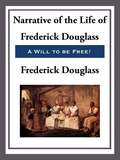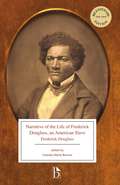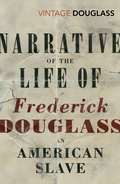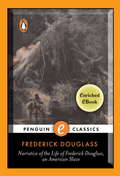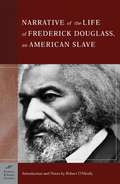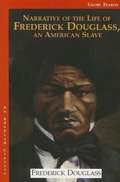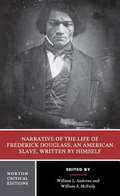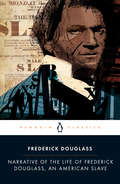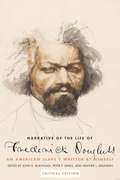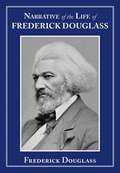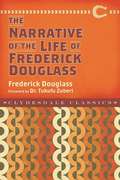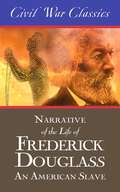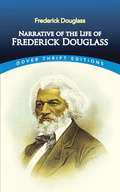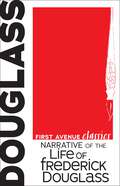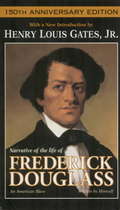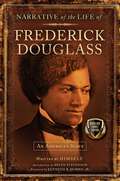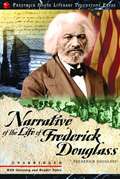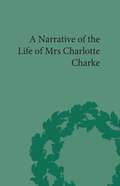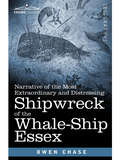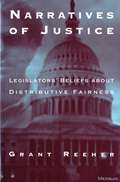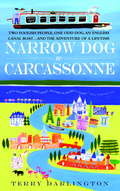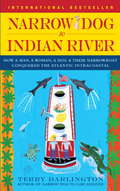- Table View
- List View
Narrative of the Life of Frederick Douglass, An American Slave
by Frederick DouglassNarrative of the Life of Frederick Douglass is one of the most influential autobiographies ever written. This classic did as much as or more than any other book to motivate the abolitionist to continue to fight for freedom in American. Frederick Douglass was born a slave, he escaped a brutal system, and through sheer force of will, educated himself and became an abolitionist, editor, orator, author, statesman, and reformer. This is one of the most unlikely and powerful success stories ever written.
Narrative of the Life of Frederick Douglass, An American Slave
by Frederick DouglassRecognizing that Douglass was bought and sold on the northern abolitionist podium no less than on thesouthern auction block, this edition introduces readers to Douglass’s multiple declarations ofindependence. Douglass’s Narrative appears alongside his private correspondence as well as his earlyspeeches and writings in which he relied on powerful language to do justice to the “grim horrors ofslavery.” For the first time, this volume also traces the activism and authorship of Frederick Douglass notin isolation but in the context of the reformist work of his wife, Anna Murray, and his daughters and sons.
Narrative of the Life of Frederick Douglass, an American Slave
by Frederick DouglassFrederick Douglass was a key figure in helping to secure the abolition of slavery in America – discover his Narrative. A masterpiece … [Douglass] was not only self-educated, with a love of language which should still be an inspiration; he was also self-created’ New York Times Frederick Douglass was born into slavery in Maryland in 1818. After his escape in 1838 he became an ardent abolitionist, and his autobiography was an instant bestseller upon publication in 1845. In it he describes with harrowing honesty his life as a slave – the cruelty he suffered at the hands of plantation owners; his struggles to educate himself in a world where slaves are deliberately kept ignorant; and ultimately, his fight for his right to freedom. A passionately written, intelligent and highly emotive indictment of slavery, his principle preoccupation was that slavery could be eradicated only through education. This text was key in helping to secure its eventual abolition.
Narrative of the Life of Frederick Douglass, an American Slave
by Houston A. Baker Jr.Published in 1845, this autobiography powerfully details the life of the internationally famous abolitionist Frederick Douglass from his birth into slavery in 1818 to his escape to the North in 1838 - how he endured the daily physical and spiritual brutalities of his owners and drivers, how he learned to read and write, and how he grew into a man who could only live free or die. In his introduction, Houston A. Baker, Jr. , discusses the slave narrative as a distinct American literary genre and points out its social, political, historical, and literary significance, past and present.
Narrative of the Life of Frederick Douglass, an American Slave
by Robert G. O'MeallyThe story accounts Douglass's life from early childhood growing up on a Southern Plantation to his eventual escape to the North. Douglass tells of his life with various owners, his struggle to learn and teach other slaves, and his eventual escape from slavery. As an escaped slave Douglass becomes a passionate abolitionist and served as an inspiration to many other early African Americans.
Narrative of the Life of Frederick Douglass, an American Slave (An Adapted Classic)
by Frederick DouglassIt is generally held to be the most famous of a number of narratives written by former slaves during the same period. Includes a reading review at the end.
Narrative of the Life of Frederick Douglass, an American Slave, Written by Himself
by Frederick Douglass William L. Andrews William S. McfeelyIn addition to its far-reaching impact on the antislavery movement in the United States and abroad, Douglass's fugitive slave narrative won recognition for its literary excellence, which has since earned it a place among the classics of nineteenth-century American autobiography. This Norton Critical Edition reprints the 1845 first edition of Douglass's compelling work. Explanatory annotations accompany the text. A rich selection of "Contexts" provides the reader with contemporary perspectives. Included are the little-known preface that Douglass wrote in 1846 for the second Irish edition; a public exchange of letters between A. C. C. Thompson, a former slaveholder, and Douglass; three autobiographical portraits of Douglass's parents; Douglass's account of his escape from slavery, which he chose not to include in the 1845 Narrative; samples of Douglass's use of his slave experience in two of his most influential antislavery speeches; and reminiscences by James Monroe Gregory and Elizabeth Cady Stanton of Douglass as both orator and friend. [This text is listed as an example that meets Common Core Standards in English language arts in grades 6-8 at http://www.corestandards.org.]
Narrative of the Life of Frederick Douglass, an American Slave: Autobiography (Text Connections Ser.)
by Frederick Douglass Ira DworkinAn updated edition of a classic African American autobiography, with new supplementary materials The preeminent American slave narrative first published in 1845, Frederick Douglass's Narrative powerfully details the life of the abolitionist from his birth into slavery in 1818 to his escape to the North in 1838, how he endured the daily physical and spiritual brutalities of his owners and driver, how he learned to read and write, and how he grew into a man who could only live free or die. In addition to Douglass's classic autobiography, this new edition also includes his most famous speech "What to the Slave Is the Fourth of July?" and his only known work of fiction, The Heroic Slave, which was written, in part, as a response to Harriet Beecher Stowe's Uncle Tom's Cabin.
Narrative of the Life of Frederick Douglass, an American Slave: Written by Himself, Critical Edition
by Frederick Douglass Peter P. Hinks Heather L. Kaufman Prof. John R. McKivigan IVFrederick Douglass's autobiography, Narrative of the Life of Frederick Douglass, An American Slave, is widely regarded as a classic of American nineteenth-century history, of African-American studies, and of literature. In 1845, just seven years after his escape from slavery, the young Douglass published this powerful account of his life as a slave and his triumph over oppression. The book, which marked the beginning of Douglass's career as an impassioned writer, journalist, and orator for the abolitionist cause, reveals the terrors he faced as a slave, the brutalities of his owners and overseers, and his harrowing escape to the North. This edition of the book, based on the authoritative text that appears in Yale University Press's multivolume edition of the Frederick Douglass Papers, is the only edition of Douglass's Narrative designated as an Approved Text by the Modern Language Association's Committee on Scholarly Editions. It includes a chronology of Douglass's life, a thorough introduction by the eminent Douglass scholar John Blassingame, historical notes, and reader responses to the first edition of 1845. "None so dramatically as Douglass integrated both the horror and the great quest of the African-American experience into the deep stream of American autobiography. He advanced and extended that tradition and is rightfully designated one of its greatest practitioners. "--John W. Blassingame, from the introduction
Narrative of the Life of Frederick Douglass: An American Slave
by Frederick DouglassThis autobiography of the author talks about his struggle to gain freedom and includes a background note about the book and a lively afterword.
Narrative of the Life of Frederick Douglass: An American Slave
by Frederick Douglass Molly SmithFrederick Douglass was born a slave and died a well-respected writer and orator. After escaping slavery at twenty years of age, he began to speak out against the institution, eventually becoming a leading abolitionist. His books and speeches helped fuel the movement for freedom, and Abraham Lincoln consulted him during the Civil War.
Narrative of the Life of Frederick Douglass: An American Slave
by Frederick DouglassThe story of Frederick Douglass is passionate, harrowing, and inspiring. As a former slave, impassioned abolitionist, gifted writer, newspaper editor, and powerful orator, Douglass was an immense, motivational figure. His early life, filled with physical abuse, deprivation, and tragedy, adds up to a heart-wrenching history. However, he was able to overcome everything that bound a slave to his life and become a leading spokesman for his people.In this first of his three autobiographies, Douglass relates graphic descriptions of his childhood, his shocking experiences as a slave, and his thrilling escape from slavery to safety in the North and his pivotal freedom.Originally published in 1845, a date significant for the fact that very few African Americans could read or write at that time, this tale of sadness, danger, and eventual liberation will appeal to readers of all kinds. For those interested in African American history and the life of one of the most daring and heroic champions of civil rights, this page-turner is a perfect library addition.
Narrative of the Life of Frederick Douglass: An American Slave
by Frederick DouglassPackaged in handsome and affordable trade editions, Clydesdale Classics is a new series of essential literary works. From the musings of literary geniuses like Mark Twain in The Adventures of Huckleberry Finn to the striking personal narrative of Harriet Jacobs in Incidents in the Life of a Slave Girl, this new series is a comprehensive collection of our literary history through the words of the exceptional few.The Narrative of the Life of Frederick Douglass is perhaps the most widely read and well-known slave narrative. Originally published in 1845, the work was an instant success, selling more than 11,000 copies in the first three years. Written as a memoir of his life and experiences, the book addresses the issues of slavery from a firsthand perspective with a sage eloquence. The narrative draws from various points of Douglass’s life in stark detail: the cruelty he experienced as a slave, his escape to freedom, and how he became a famous orator and abolitionist.Initially, early skeptics had a hard time accepting that such a profound text was written by an uneducated African American slave. However, this theory was quickly disproven when he spoke in public, famously giving extraordinarily articulate speeches. The Narrative of the Life of Frederick Douglass is no exception to Douglass’s vigor, poise, and wit he exemplified in his oration. Here is a story of a man who faced extreme hardship and adversity-and rose above it to write one of the most important and influential books in history.
Narrative of the Life of Frederick Douglass: An American Slave (Civil War Classics)
by Frederick DouglassTo commemorate the 150th Anniversary of the end of the Civil War, Diversion Books is publishing seminal works of the era: stories told by the men and women who led, who fought, and who lived in an America that had come apart at the seams. One of the most important figures of the Civil War, Frederick Douglass, was born into slavery but rose to become a tremendous orator, an impassioned abolitionist, and a representative of all who remained voiceless through slavery and oppression. His narrative resonates today with its eloquence, its incendiary history, and its profound and moving arguments for the humanity, and the equality, of Americans.
Narrative of the Life of Frederick Douglass: An American Slave (Dover Thrift Editions: Black History)
by Frederick DouglassFormer slave, impassioned abolitionist, brilliant writer, newspaper editor and eloquent orator whose speeches fired the abolitionist cause, Frederick Douglass (1818–1895) led an astounding life. Physical abuse, deprivation and tragedy plagued his early years, yet through sheer force of character he was able to overcome these obstacles to become a leading spokesman for his people.In this, the first and most frequently read of his three autobiographies, Douglass provides graphic descriptions of his childhood and horrifying experiences as a slave as well as a harrowing record of his dramatic escape to the North and eventual freedom.Published in 1845 to quell doubts about his origins — since few slaves of that period could write — the Narrative is admired today for its extraordinary passion, sensitive and vivid descriptions and storytelling power. It belongs in the library of anyone interested in African-American history and the life of one of the country's most courageous and influential champions of civil rights.
Narrative of the Life of Frederick Douglass: An American Slave (First Avenue Classics ™)
by Frederick DouglassIn 1817 or 1818, Frederick Douglass was born into slavery on a plantation in Maryland. As a young boy, he served in a household, but as he grew older, he faced increasingly brutal conditions and cruel owners. After many years, he escaped to freedom in New York City and began to publicly denounce slavery through writings and speeches. This unabridged version of Douglass's powerful autobiography, first published in 1845, provides an honest, firsthand account of the horrors of slavery in the United States.
Narrative of the Life of Frederick Douglass: An American Slave (Text Connections)
by Frederick Douglass Henry Louis GatesThis dramatic autobiography of the early life of an American slave was first published in 1845, when its young author had just achieved his freedom. Douglass' eloquence gives a clear indication of the powerful principles that led him to become the first great African-American leader in the United States.
Narrative of the Life of Frederick Douglass: An American Slave, Written by Himself (The John Harvard Library #105)
by Frederick DouglassNo book more vividly explains the horror of American slavery and the emotional impetus behind the antislavery movement than Frederick Douglass’s Narrative. In an introductory essay, Robert B. Stepto reexamines the extraordinary life and achievement of a man who escaped from slavery to become a leading abolitionist and one of our most important writers. The John Harvard Library text reproduces the first edition, published in Boston in 1845.
Narrative of the Life of Frederick Douglass: The Classic African American Autobiography By Frederick Douglass (Classic Bks.)
by Frederick DouglassFamilies trapped in poverty and systemic injustices. Children denied civil rights because of race. A nation with immense potential for freedom spiraling into prejudice, violence, and hate. The country Frederick Douglass knew over one-hundred years ago is strikingly similar to the one we live in today. The truth, lessons, and hope he offered during his remarkable lifetime not only helped shape Abraham Lincoln&’s presidency and the American Civil Rights movement, they can guide and inspire us in our own cultural moment. Born into slavery in 1818, Douglass escaped to New York City at the age of twenty, determined to tell his story and fight for the rights of all men and women to be free. His first autobiography, Narrative of the Life of Frederick Douglass, an American Slave, remains one of the most influential books of modern times, as captivating and stirring now as it was when it was first published in 1845. This new edition of Douglass&’s world-changing work includes intimate reflections from modern-day leaders, a foreword and photograph section from Douglass&’s direct descendants, and a timeline beginning in 1619 with an emphasis on Douglass&’s life and family. Whether you are interested in the history of the abolitionist movement and the Civil War, committed to the cause of abolishing modern-day slavery, or need renewed vigor to fight for human rights today, this timeless book will equip and inspire you to follow your passions, knowing that even against all odds, one person can change the world.
Narrative of the Life of Fredrick Douglass
by Frederick DouglassThis Prestwick House Literary Touchstone Edition includes a glossary and reader's notes to help the modern reader contend with Douglass' nineteenth-century style and vocabulary. Born into a family of slaves, Frederick Douglass educated himself through sheer determination. His unconquered will to triumph over his circumstances makes his one of America's best and most unlikely success stories. Douglass' own account of his journey from slave to one of America's great statesmen, writers, and orators is as fascinating as it is inspiring.
Narrative of the Life of Mrs Charlotte Charke (Pickering Women's Classics)
by Robert M RehderIn this picaresque novel, Charlotte Clarke recalls her life as an actress, and in particular, the difficulties facing a woman trying to make her way in a man's world. The issues of women's writing, education, motherhood, sexuality, and cross-dressing all come under scrutiny.
Narrative of the Most Extraordinary and Distressing Shipwreck of the Whale-Ship Essex
by Owen ChaseNarrative of the Most Extraordinary and Distressing Shipwreck of the Whale-ship Essex is an account by first mate Owen Chase of the Essex, a whale ship from Nantucket, Massachusetts, that was sunk by a sperm whale in the Pacific Ocean near South American in 1820. Of the twenty-man crew, only eight survived the horrific ordeal; some men were stranded on an island, all remaining crew were forced to eat food tainted by seawater and drink their own urine, and finally, when members of the crew started dying, those still alive resorted to cannibalism until they were rescued. Narrative of the Whale-ship Essex inspired Herman Melville to write his enduring classic Moby-Dick in 1851; it also inspired the 2015 movie In the Heart of the Sea, based on the 2000 best-selling book of the same name.
Narrow Dog to Carcassonne
by Terry Darlington"We could bore ourselves to death, drink ourselves to death, or have a bit of an adventure. . . "It was absurd. It was foolhardy. And it was glorious. When they retired, Terry Darlington and his somewhat saner wife Monica--together with their dog, a whippet named Jim--chucked their earthbound life and set out in an utterly unseaworthy sixty-foot canal narrowboat across the notoriously treacherous English Channel and down to the South of France. Aboard thePhyllis May,you'll dive through six-foot waves in the Channel and be swept down the terrible Rhône. You'll meet the French nobody meets--poets, captains, scholars, madmen; they all want to know the couple on the painted boat and their narrow dog. You'll visit the France nobody knows--the backwaters of Flanders, the canals beneath Paris, and the forbidden routes to the wine-dark Mediterranean Sea. Aliens, trolls, gongoozlers, killer fish, and the walking dead all stand between our two-person, one-whippet crew and their goal: the ancient, many-towered city of Carcassonne. A tale of travel, travail, dubious wine, a balky pump, and a boat built for only a few feet of water, this exuberantly inventive and hugely entertaining odyssey of the spirit, senses, and heart will enchant lovers of France, England, and all that lies between.
Narrow Dog to Indian River
by Terry DarlingtonFrom Virginia to Florida in an English canal boat. Join the authors of "one of the most hilarious travel memoirs ever written"* on a wild odyssey aboard one of the most unlikely craft ever to sail U. S. waters. No one had ever sailed an English narrowboat in the U. S. before--for reasons that become clear when Terry Darlington, his wife, Monica, and their well-traveled dog, a whippet named Jim, begin a nine-month voyage down the 1,150-mile Intracoastal Waterway. But no sooner do they set out in the seven-foot-widePhyllis Maythan they encounter an ice storm in Virginia and piranhas in North Carolina. The Georgia coast is a madman's jigsaw and in Florida the alligators wait patiently for Jim. But as they wend their way through golden marshes, incomparable cities, and lost arcadias, the intrepid trio aboard the beautiful painted boat reveals a South few of us have ever seen. And with frequent stops to dine on sweet tea, grits, and the freshest of the day's catch, they make plenty of strange companions along the way--from wayfarers stopping to give Jim a good scratch behind the ears to ex-CIA agents and the Good Ole Boys of the Deep South--and discover that everyone has a story they're only too willing to share. Beautifully written, lovingly observed and very funny,Narrow Dog to Indian Rivertakes you on a dangerous, surprising, and always entertaining journey through the wonderland of the South. *Booklist
